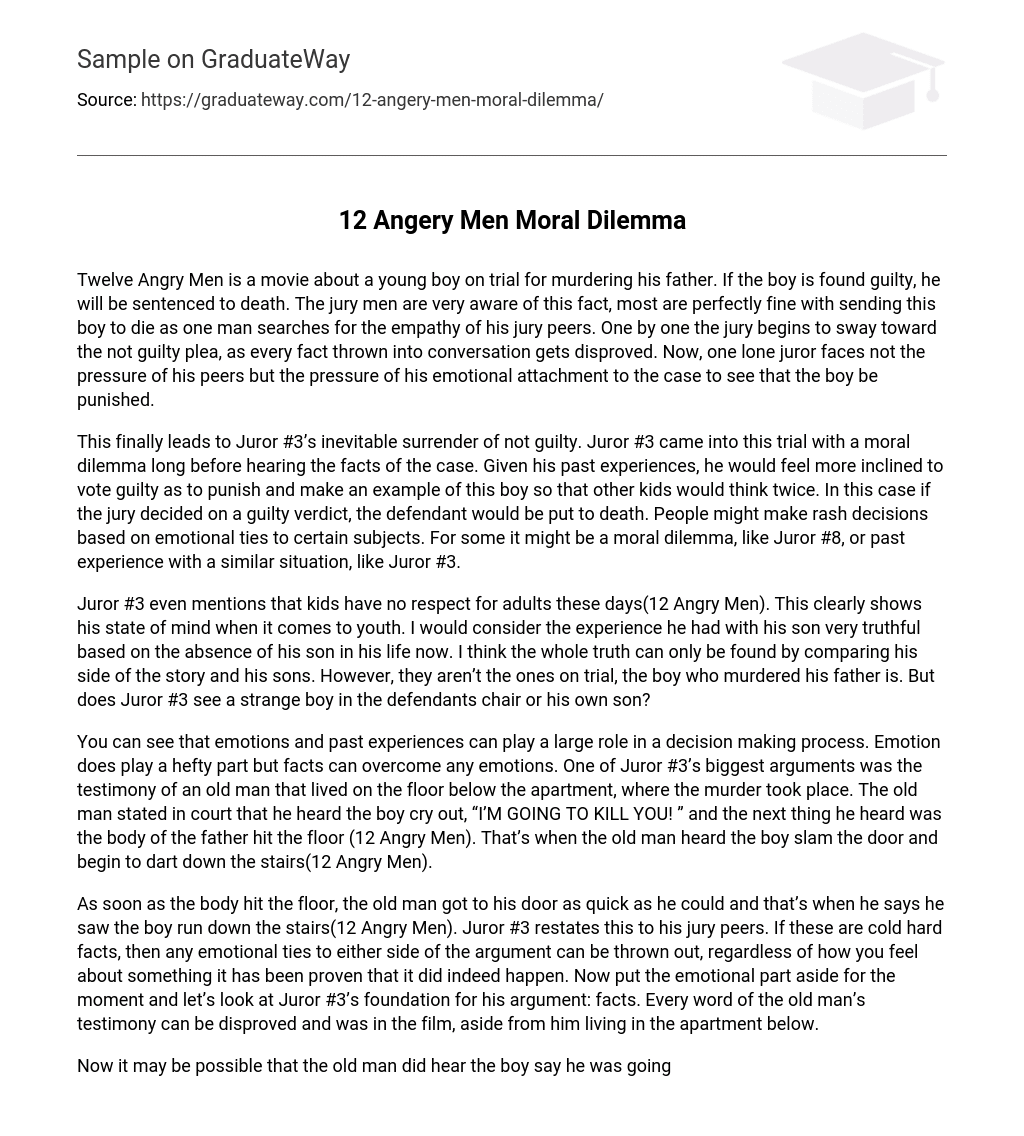The film “Twelve Angry Men” centers around the trial of a young boy who stands accused of murdering his father. If found guilty, he will face the death penalty. While the jury members are aware of the gravity of this outcome, most show indifference towards condemning the boy to die. Nonetheless, one juror endeavors to evoke empathy and compassion among his peers. Gradually, each member of the jury begins to lean towards a verdict of not guilty as they dismantle every piece of evidence presented. Now, only one juror remains steadfast, confronting peer pressure while grappling with an emotional connection to the case and a desire for retribution against the boy’s actions.
The not guilty verdict is eventually accepted by Juror #3, who initially entered the trial with a moral conflict already present. Before even learning the facts of the case, Juror #3 was inclined to vote guilty due to past experiences and a desire to punish and set an example for the defendant in order to deter similar offenses by young individuals. A guilty verdict would result in the defendant’s death penalty. Emotional connections can sometimes lead people to make impulsive decisions. While Juror #8 faced a moral dilemma, Juror #3 was influenced by previous encounters with comparable situations.
Juror #3 discusses the lack of respect that today’s youth have for adults, as evidenced in 12 Angry Men. This demonstrates his mindset regarding young people. Given the absence of his son from his life, I believe his experience with his own child holds true. To uncover the entire truth, it is necessary to compare his perspective with that of his son. Nonetheless, it is important to remember that the one on trial is not Juror #3 or his son, but rather the boy who committed patricide. Is Juror #3 seeing an unfamiliar boy in the defendant’s chair, or is he seeing his own son?
The decision-making process can be affected by emotions and past experiences, but facts have the power to override these emotions. Juror #3 made a strong argument about the testimony of an elderly man who lived on a lower floor of the apartment where the murder occurred. This witness claimed to have heard the boy shouting, “I’m going to kill you!” followed by the sound of the father’s body hitting the floor. Furthermore, he heard the boy forcefully closing the door and rapidly descending down the stairs.
The old man promptly reached his door after the body fell to the ground and claims to have witnessed the boy running down the stairs (12 Angry Men). Juror #3 repeats this testimony to his fellow jurors. If these facts are true, any personal feelings towards either side of the argument become irrelevant. Regardless of individual opinions, it has been substantiated that the incident did occur. Let’s set aside emotional reactions for now and focus on Juror #3’s basis for his argument: concrete evidence. Every aspect of the old man’s statement, except for the fact that he resides in the apartment below, was proven false in the film.
It is possible that the elderly man heard the boy mention his intention to kill his father and heard the sound of a body hitting the floor from the nearby L train. However, it is unlikely. The man insists that he also heard the boy running out of his apartment and down the steps immediately after hearing the body hit the floor. This claim is proven impossible due to the physical limitations of the elderly man. He stated that it took him no longer than 15 seconds to reach the front door from the other side of his apartment where he heard the noise, after the body hit the floor (12 Angry Men).
Juror #8 decides to reenact the old man’s movement towards the door, acknowledging that it is impressive for an old man with a limp to reach the door in 15 seconds. However, Juror #8 provides evidence that it must have taken at least 43 seconds. While attempting to convince Juror #3 of this, Juror #3 accidentally reveals his defeat by angrily exclaiming that one cannot trust anything an old man says. (12 Angry Men)
Stubbornly, all that remains for him to argue is his emotional attachment to the choice of guilty or not guilty. The answer to the real question is unclear, and both sides have irrefutable facts. Many individuals tend to rely on their feelings when faced with such situations. However, Juror #3 failed to approach this case with an open mind. The facts he presented had already been proven wrong, yet he chose to persist in his conviction of guilt, perhaps seeking a moral triumph over today’s younger generation.
Perhaps it is more about his son. He shares a heart-wrenching tale with the other members of the jury. He witnessed his son fleeing from a fight, and the incident left him so humiliated that he vowed to shape his son into a respectable man (12 Angry Men). However, one day the man he had raised delivered a powerful blow that knocked him down, and he hasn’t seen his son since (12 Angry Men). His own personal experience has been distorting his perception of the truth throughout the entire process. When a person’s life is at stake, allowing emotions to influence judgment can cloud anyone’s decisions, regardless of their intentions.





